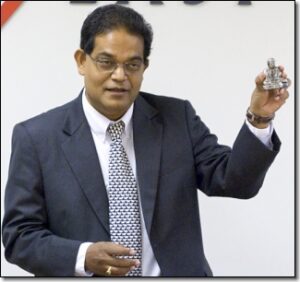
"APISA - building an Asian identity beyond
exceptionalism and parochialism"
Amitav Acharya
Founding President
In November 2001, 30 academics from research institutes, think tanks, and universities introduced the idea of launching an Asian-based academic organization dedicated to the advancement of political and international studies. It was the general consensus of the meeting that Asian scholars had been marginalized from the decision-making processes of the Western-based associations of a similar nature. Asian schools of thought had been stifled as a consequence of the American hegemony in the social sciences, and that the state of Asian studies in general was underdeveloped. In the light of these concerns, APISA was established and held its founding congress in Singapore in 2003.
Patterned after academic institutions in North America and Western Europe, the organization seeks to promote theoretically informed comparative scholarships, based on the Asian experience in the fields of conflict and peace, democracy and governance, development, and area studies.
APISA Short Video
APISA's Objectives
- Promotion of research and teaching in all areas of the social sciences, in particular disciplines related to political and international studies
- Dissemination of research findings, institutional skills and syllabi
- Promotion of cooperation and exchanges between individuals and institutions
- Promotion of regional and sub-regional peace through epistemic communities
APISA's philosophy
Democracy, equality and peace through epistemic communities
APISA believes that democracy, social and economic equality as well as peace and security in Asia can be achieved through epistemic communities.
APISA's Vision
A network of networks for the Asian scientific community
APISA's network of networks assists the Asian scientific community in promoting research and teaching in all disciplines of social sciences, disseminating research findings, and in establishing cooperation between individuals, institutions and existing academic networks.
Related Documents
Building an Asia-Pacific Peace Community
From a Human Security Perspective (PDF)
Sorpong Peou*
Keynote Address to the 9th Congress of the Asian Political and International Studies Association (APISA), 11 -12 September 2015, Phnom Penh, Cambodia.
Identity Without Exceptionalism:
Challenges for Asian Political and International Studies (PDF)
Amitav Acharya**
Keynote Address to the Inaugural Workshop of the Asian Political and International Studies Association (APISA), 1-2 November 2001, Kuala Lumpur, Malaysia.
* Sorpong Peou is Chair of the Department of Politics and Public Administration, Ryerson University, Canada
** Amitav Acharya is Professor of International Relations and the UNESCO Chair in Transnational Challenges and Governance at the School of International Service, American University, Washington, DC
APISA Executive Committee (2025–)
President
Brendan Howe, Ewha Womans University, South Korea
Executive Secretary
Haruko Satoh, Osaka School of International Public Policy, Osaka University, Japan
Mely Caballero Anthony, RSIS, Nanyang Technological University, Singapore
Rosalie Arcala Hall, University of the Philippines, Philippines
Paul Chambers, Naresuan University, Thailand
Ketut Erawan, Institute for Peace and Democracy, Bali, Indonesia
Ratih Indraswari, Universitas Katolik Parahyangan, Bandung, Indonesia
Saya Kiba, Kobe City University of Foreign Studies, Japan
Saeme Kim, Ewha Womans University, South Korea
Cheng Chwee Kuik, National University of Malaysia, Malaysia
Christian Schafferer, Overseas Chinese University, Taiwan
Julio Teehankee, De La Salle University, Philippines
Napisa Waitoolkiat, Naresuan University, Thailand
Sylvia Yazid, Universitas Katolik Parahyangan, Bandung, Indonesia
